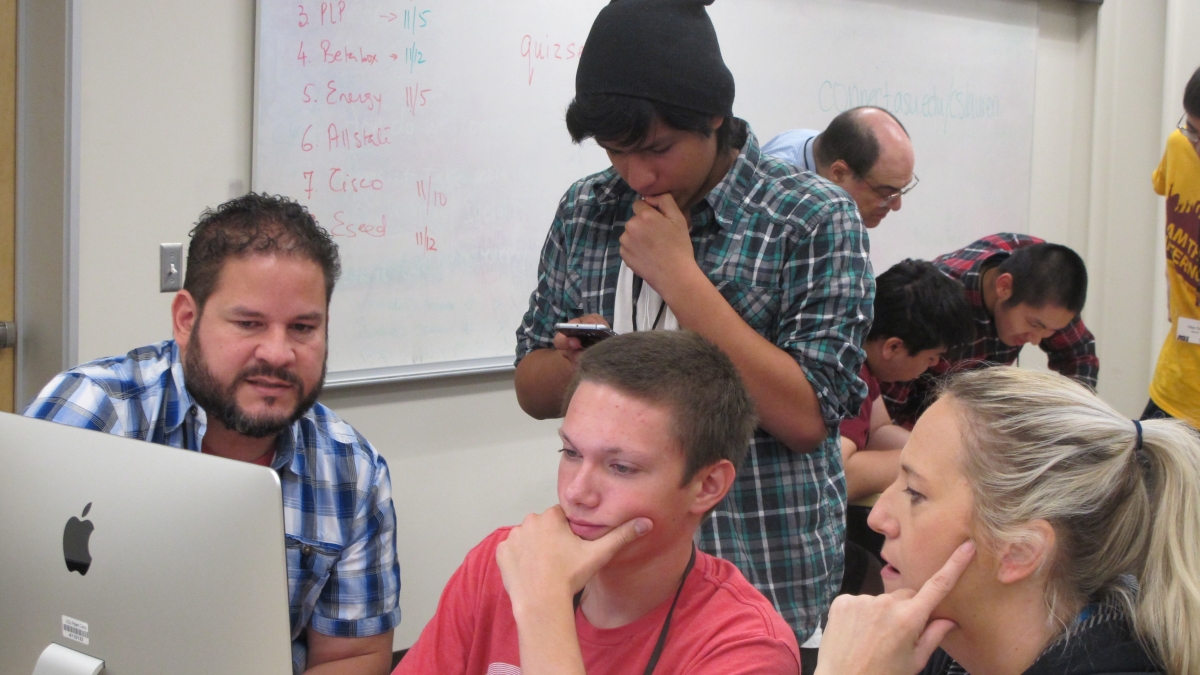Project App Maker Pro aims to increase high schoolers' interest in STEM fields

High school students and teachers working collaboratively in the Power Track Design Village in the first Project AMP cohort.
To address the national need for greater numbers of students to enter STEM (science, technology, engineering and mathematics) fields, Project AMP at Arizona State University is conducting a three-year program that taps into the tech interests and talents of students grades 9-11 as a way to increase their interest in STEM.
Project AMP (App Maker Pro) — in which teams of students and teachers come up with software apps to address workplace and community needs — also aims to help high school STEM teachers enhance their technology expertise and knowledge of applications that will promote student learning.
In AMP Design Villages, teams of five (three students and two teachers) collaborate to develop software apps to address real-world needs — for example, in health care or city planning. Villages are led by university and industry scientists with STEM, software and programming expertise. Leaders are assisted by mentors who are computer science majors, who also serve as role models for the student participants.
After creating their own apps, Villagers will design and conduct — with mentorship from AMP staff — Mini-Design Villages for students, teachers and members of the community in their home schools or school districts.
All completed, tested and refined apps will be uploaded to a national database.
During the three years of the project, three cohorts of villagers (150 participants in all: 30 students and 20 teachers per cohort) will be served, along with the hundreds of students reached by the in-school and after-school programs offered by AMP participants.
Throughout the program, student and teacher activities are monitored, and content knowledge and interests assessed. Results will add to knowledge about motivation for student program selection and career choice, as well as for professional-development approaches that enhance teacher knowledge of STEM careers.
On Nov. 14, AMP Cohort 1 completed the first of its five consecutive project sessions. A session is a semester (six Saturday mornings) or a summer (two weeks). The last day of each session is dedicated to a Showcase Open House where each villager picks up the microphone, describes some aspect of the project that was explored, and answers questions from the audience — family, friends, members of the community.
The two Design Villages in Cohort 1 are: Health Tech, co-led by Dr. Rachel Rowe, neuroscientist at Phoenix Children’s Hospital, and Dr. Ashish Amresh, assistant professor of computer science at ASU. Mentors are Pragathi Gopal, Taruni Kancharla and Zach Moore. The Power Track Village is co-led by ASU faculty, Dr. Lina Karam, professor of electrical engineering, Dr. Timothy Lindquist, professor of computer science, and Dr. David Meltzer, associate professor of physics education. Mentors are Jason Luc, Yifan Tian and Shaojia Zhao.
Laura Gonzales-Macias, one of the parents of a participant, commented, “Riley (daughter), as part of this creative and talented team of students and faculty, has explored new technologies and strengthened her communication skills. I’m deeply grateful to the Project AMP staff."
Project AMP is directed by professor Carole Greenes and her PRIME Center staff, executive director Mary Cavanagh, project manager James Kim and project co-manager Javier Duarte. Project evaluator is Dr. Melissa Kovacs.
Project AMP participants hail from the school districts of Avondale, Bagdad, Chandler, Gilbert, Higley, Mesa, Phoenix, Tempe and Queen Creek, as well as the San Tan Charter School and the Arizona Virtual Academy. Session 2 begins on Jan. 23.
Contact: Carole Greenes, cgreenes@asu.edu and Mary Cavanagh, mcavanagh@asu.edu.
More Science and technology

ASU water polo player defends the goal — and our data
Marie Rudasics is the last line of defense.Six players advance across the pool with a single objective in mind: making sure that…

Diagnosing data corruption
You are in your doctor’s office for your annual physical and you notice the change. This year, your doctor no longer has your…
Large-scale study reveals true impact of ASU VR lab on science education
Students at Arizona State University love the Dreamscape Learn virtual reality biology experiences, and the intense engagement it…

